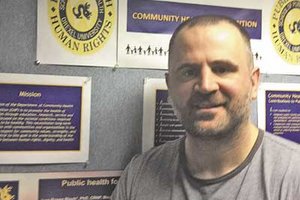The American Public Health Association earlier this month honored a Drexel University doctoral student with an award named for a founder of its LGBT Caucus, who was also a pioneering Philadelphia health professional.
At its conference earlier this month, the caucus presented Aleksandar Kecojevic with its Walter J. Lear Outstanding Student Research Award for his work on a study that investigated drug use by LGBT youth.
Lear, Philadelphia’s first deputy health commissioner, was an LGBT-rights and health activist who helped launch the predecessors of the William Way LGBT Community Center and Mazzoni Center, among several other LGBT agencies.
A native of Serbia, Kecojevic, 40, has been living in the United States for the past decade after spending several years in Canada. He moved to Philadelphia last year to begin his studies at Drexel and is now in his second year at the university’s School of Public Health.
“I’ve pretty much always been interested in medical research,” he said. “When I was at Johns Hopkins in Baltimore, I was working on HIV research and testing paradigms and that got me interested in drug-abuse research, which brought me to Drexel.”
Kecojevic was matched with advisor Dr. Stephen Lankenau, a Drexel School of Public Health associate professor who at the time was working on a study of prescription-drug abuse among high-risk youth in New York City and Los Angeles.
“In the last 10 years there’s really been a growing epidemic of prescription drug abuse in this county,” Kecojevic said. “But most of the research that’s been done about it has focused on college students or adult populations, so there really wasn’t much that looked specifically at prescription-drug abuse among high-risk youth populations.”
Lankenau’s study began in 2008 and, by the time Kecojevic came on board, the data-collection process was near completion, so Kecojevic focused on analysis.
The study sought to examine patterns of drug abuse, such as combinations of illicit and prescription-drug abuse, and Kecojevic noticed another pattern that emerged when analyzing the numbers.
“I started to see that a lot of the youth identified as LGBT,” said Kecojevic, an LGBT community member himself. “About one-third of the sample ended up being LGBT youth. So I decided to use that information to look at differences between LGBT and heterosexual youth, and there were quite a few differences.”
While rates of illicit drug use were comparable among the LGBT and heterosexual youth populations, LGBT youth reported higher rates of non-medical use of prescription drugs (NMUPD).
Kecojevic said LGBT young people were particularly drawn to opiates and tranquilizers.
The LGBT youth reported more frequent prescriptions from physicians and began taking the prescription drugs for non-medical uses on average one year earlier than their heterosexual counterparts.
LGBT youth also were more likely to report NMUPD by a family member and were more likely than the heterosexual youth to have injected the drugs. The LGBT youth were also more likely to report a sexually transmitted disease or infection, including HIV, chlamydia, gonorrhea and syphilis, but not Hepatitis C or scabies.
Kecojevic noted that NMUPD among young people is an area that should merit much more research, considering that prescription drugs are the second-most commonly used by youth, following marijuana.
While the Lear award will enhance attention given to the LGBT aspect of the NMUPD epidemic, Kecojevic said it also holds a personal significance for him because of its namesake.
“He was a real LGBT icon in Philadelphia and did a lot of work on publicizing the health issues that matter to the LGBT community,” Kecojevic said. “So I certainly was very pleased and very honored to receive an award named for him.”
Lear, who died last year, was a caucus founder and longtime chair, and the award has been given in his name since 2003. Kecojevic is the first Drexel student to receive the honor.
Jen Colletta can be reached at jen@epgn.com.
